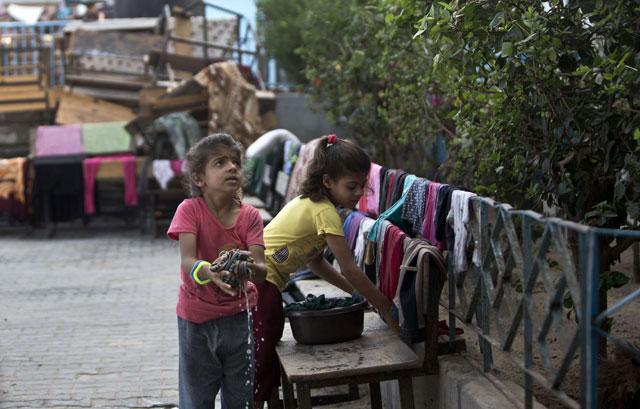You are here
With Israel thaw, Hamas leader tours globe seeking support
By AFP - Dec 21,2019 - Last updated at Dec 21,2019
GAZA CITY, Palestinian Territories — Egypt, Turkey, Malaysia: the leader of Hamas has been on a whistle-stop tour of prominent Muslim countries seeking legitimacy and support as an informal truce firms up with Israel.
In his first major foreign tour since taking over as leader of the Palestinian Islamist movement in 2017, Ismail Haniya has sought to drum up support from allies and find new ones.
He visited the leaders of Turkey and Gulf state Qatar, both of which are longtime Hamas supporters with leaders allied to the Muslim Brotherhood — in which Hamas has its roots.
Haniya is currently in the Malaysian capital Kuala Lumpur for a summit of Muslim leaders, including Iranian President Hassan Rouhani.
The delegation is expected to travel on to Russia, Lebanon, Mauritania and Kuwait before Haniya returns to Gaza.
Blacklisted as a terrorist organisation by the European Union and the United States, Hamas has fought three wars with Israel since 2008 and does not recognise the country's right to exist.
But, ground down by 12 years of economic blockade, it has struck an informal long-term truce with Israel.
Israeli officials hint the organisation has become less dogmatic.
In the most recent major flare-up in Gaza last month, Hamas largely watched from the sidelines as Israel fought its ally Islamic Jihad.
Mukhaimer Abu Saada, a professor of political science at Al Azhar University in Gaza, said Haniya's tour was "not an ordinary visit" but part of a wider strategy.
"[Hamas] wants to bring support and strengthen its ties regionally and arrangements for a long-term ceasefire with Israel."
Hamas spokesman Hazem Qassem said the movement was seeking to "mobilise political support for the Palestinian cause".
'Keep Gaza calm'
Hamas has controlled the impoverished Gaza Strip since it ousted loyalists of Palestinian President Mahmoud Abbas in 2007.
Abbas, whose government is based in the occupied West Bank, accuses Israel and now the United States of seeking to recognise Hamas rule in order to permanently split the Palestinians.
The truce deal, the details of which remain secret, is meant to see Israel ease its crippling 12-year blockade of Gaza in exchange for calm.
Risks remain that could lead to a fourth war — rocket fire from Gaza prompted retaliatory air stikes both Thursday morning and evening, while Israel has in recent days accused Hamas of planning attacks from Turkey.
But Israel has allowed millions of dollars a month in Qatari aid to flow into Gaza for more than a year and is allowing a number of further steps, including the construction of a new field hospital next to the Israeli border fence.
Hugh Lovatt, Israel-Palestine analyst at the European Council on Foreign Relations think tank, said Israel at least tacitly supported Haniya's tour alongside the improving relations.
"In some ways Hamas has positioned itself as the more pragmatic Palestinian actor," he said, comparing them to the 84-year-old Abbas — who has been increasingly intransigent in the face of Israeli and US opposition.
"They are keeping Gaza calm."
Ofer Zalzberg, senior Middle East analyst at the International Crisis Group think tank, put Hamas' policy shift in the context of a thawing of attitudes towards Israel in the Muslim Brotherhood following a change of spiritual leader last year.
"We are seeing a shift in the wider Muslim Brotherhood towards principled engagement with Israel," he said.
"There are no signs [Hamas] will accept Israel as a permanent fact but indications they have come to accept it in the medium term and seek arrangements with it."
Israel, too, benefits from the calm, Zalzberg said, with the five years since the last war seeing strong economic growth.
But he warned that Israel was not willing to "legitimise Hamas" and the truce terms would likely remain limited.
"It is an arrangement you strike with an enemy."
In Turkey, Haniya met President Recep Tayyip Erdogan and discussed opening an official office, a Hamas source said.
This would be a new boost to the legitimacy of the group, which has an office in Qatar but elsewhere remains largely persona non grata.
But it could cause a political backlash for NATO member Turkey from its alliance partners.
"There was a promise to study the request," the source said.
Related Articles
GAZA — A senior Hamas official denied on Tuesday that Egyptian-brokered talks on reconciliation with the Palestinian Authority and a lasting
Hamas' former Gaza prime minister Ismail Haniya said on Saturday the Islamist Palestinian group would not hold any direct talks with Israel.
GAZA — Gaza's Islamist rulers Hamas on Thursday pledged to launch an investigation into rocket fire at Israel the previous day, in an appare














